

This useful present simple and present continuous speaking activity helps to illustrate to students how the present simple and present continuous tense are different and how to ask and answer questions using each tense. First, students prepare the present simple and present continuous yes/no questions together with possible follow-up questions for the items on the worksheet. Students then go around the class, asking each other the present simple and present continuous yes/no questions. When a student finds someone who answers 'Yes, I do' or 'Yes, I am' to a question, the student writes down their name and asks a follow-up question to gain more information, noting down the answer in the last column. Afterwards, students give feedback to the class on what they found out by making present simple and present continuous statements.
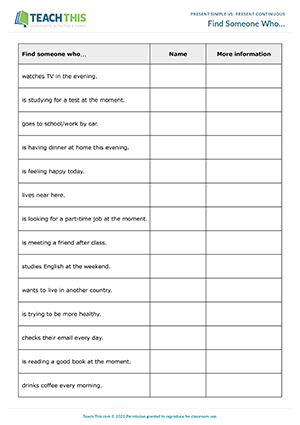 Find Someone Who Preview" width="300" height="425" />
Find Someone Who Preview" width="300" height="425" />


In this fun present simple and present continuous information gap activity, students write and then ask questions in order to complete missing information in an email. First, in two groups, students read an email and write the present simple and present continuous questions they need to ask to complete the missing information. Next, students pair up with someone from the other group and take turns asking and answering the questions in order and writing the answers in the spaces in the email. Finally, pairs check their answers by comparing worksheets.
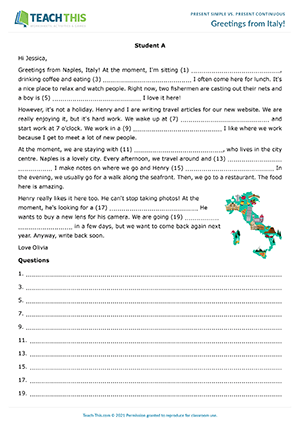


In this free present simple vs. present continuous activity, students write questions on various topics using both tenses and then ask and answer the questions with a partner. In pairs, students look at the two prompts on each card and write one question in the present simple and one in the present continuous. Students then take turns asking and answering the questions with their partner. Afterwards, students share what they found out about their partner with the class.
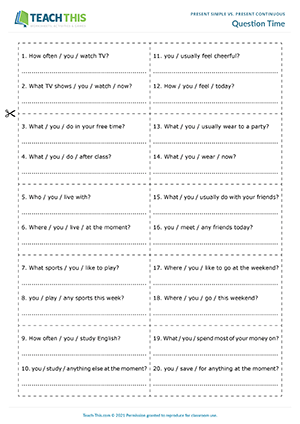


In this comprehensive present simple vs. present continuous worksheet, students revise the use of these two tenses. Students start by using phrases to write grammar rules for the present simple and the present continuous. Next, students look at time expressions and decide which ones are used with the present simple and which are used with the present continuous. Students then answer questions in the present simple or present continuous, according to the time expression used in each question. After that, students rewrite sentences, correcting the mistakes. Lastly, students complete sentences with verbs in their present simple or present continuous form.
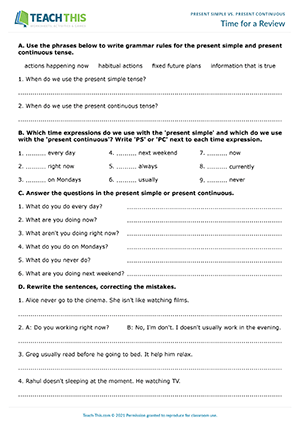


This engaging present simple vs. present continuous speaking activity helps students practice forming, asking and answering conversation questions in the present simple and present continuous tense. First, in two groups, students complete conversation questions on the worksheet in the present simple or present continuous tense using verbs in brackets. After that, students pair up with someone from the other group and take turns asking and answering the questions with their partner, responding in the present simple or present continuous, according to the tense of each question. Afterwards, students share what they found out about their partner with the class.
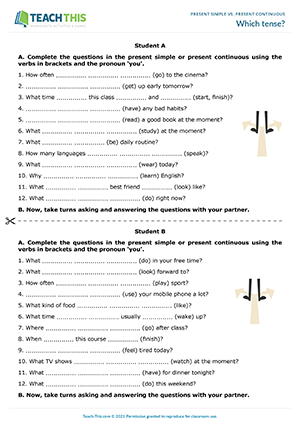


In this creative present simple vs. present continuous speaking activity, students take part in a business interview to practice asking and answering questions in the present simple and present continuous. In pairs, one student takes on the role of a journalist and the other takes on the role of Elon Musk. The journalist's task is to interview Elon Musk to find out about his work routine, current projects, plans and goals, and make notes on his answers. The student, who is Elon Musk, uses the information on the worksheet to answer the journalist's questions. First, students prepare what they are going to say, paying close attention to which parts of the interview will be in the present simple and which parts will be in the present continuous. Students then role-play the interview. Afterwards, students swap roles and repeat the role-play. Finally, students report back to the class on their interviews. As an extension, pairs write a short news article in the present simple and present continuous based on the interview.
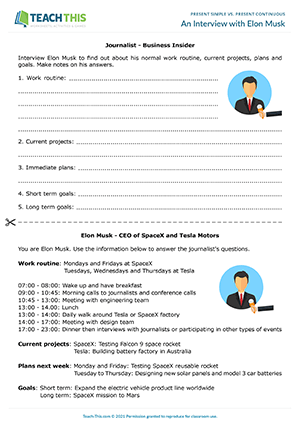


Here is a story-based present simple vs. present continuous worksheet to help students practice the present simple and present continuous. Students begin by reading the first part of a story and answering questions about it using the present simple. Students then read the next part of the story and write present continuous questions for a set of answers. Next, students complete a related text with the present simple or present continuous form of the verbs in brackets. Lastly, students put words in the correct order to complete the story.
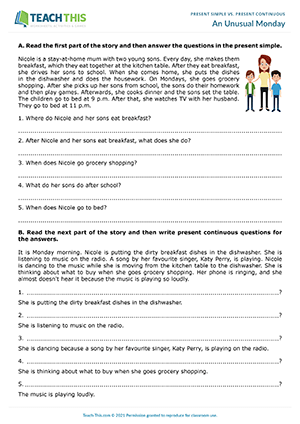


In this imaginative present simple and present continuous activity, students create a company by completing and answering questions in the present simple and present continuous. First, students complete questions in the present simple or present continuous. Next, in groups, students create a company by inventing answers to the questions. In their groups, students discuss each question in turn and write an answer in sentence form using the present simple or present continuous. Finally, each group takes turns presenting their company to the class.
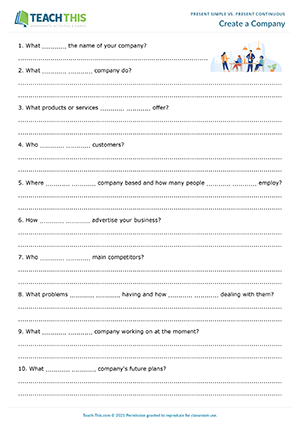


In this free present simple and present continuous game, students describe present simple or present continuous sentences for other students to guess. In groups, students take turns picking up a card and describing the sentence on the card using present simple or present continuous sentences. Students can use the verb on the card, but they are not allowed to say the sentence or clusters of words within the sentence. For example, if the card read 'I get up late on Sunday', the student might say 'Monday to Saturday, I get up at 6 a.m. The other day, I get up at 11 a.m. I like to sleep in on that day.' The other group members listen and then race to guess the sentence. The first group member to correctly guess the sentence wins and keeps the card. The student with the most cards at the end of the game is the winner.